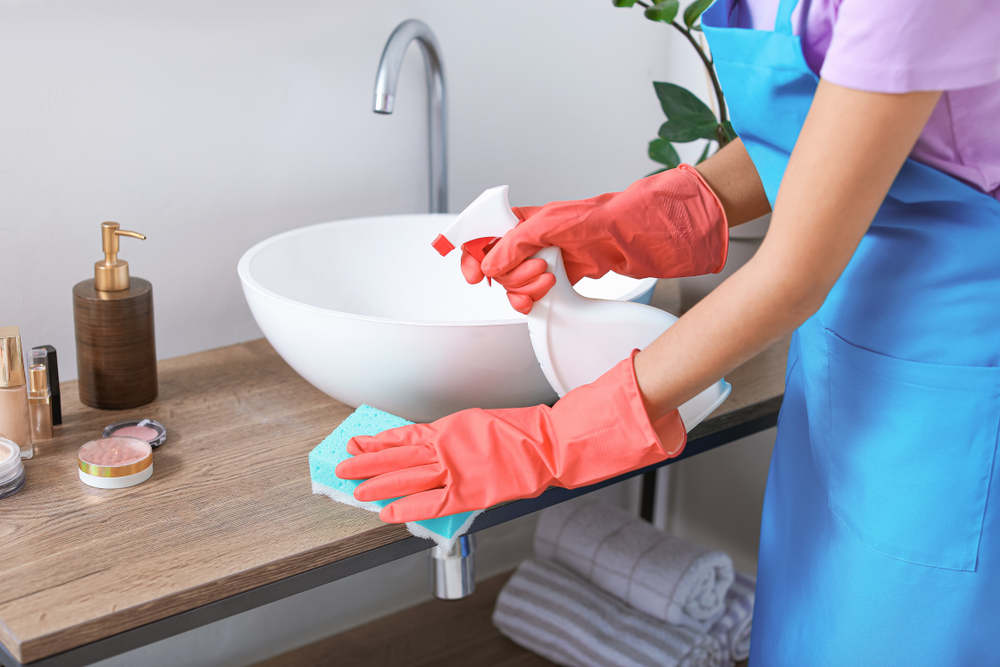Bathroom Commercial Cleaning Sydney
Bathrooms are used for cleaning ourselves. Is it any wonder they get fairly dirty fairly quickly. It requires constant effort to keep them clean. This is a matter of both maintaining appearances and hygiene. It is rather had to clean ourselves if the bathroom is unhygienic.
Sink Commercial Cleaning Sydney
Sinks collect grime and bacteria. We need to get rid of the grime keep things looking neat, and be rid of both the grime and bacteria for the sake of being sanitary.
- Use a bathroom cleanser to spray in and around the bathroom sink. Them wipe this down with a clean rag or sponge.
- Use a disinfectant on the sink and surrounding area to get rid of germs, bacteria and possibly mould and mildew. Benchtop surfaces can be cleaned with a disinfectant/sanitiser wipe.
- Use disinfectant on the faucet and tap handles. The rinse clean.
- If the drain becomes blocked you can clear the pipes using Bi Carb of Soda and vinegar. Leave this for and hour, and then pour boiling water down the drain.
Clean sinks twice per week.
Bathroom Fans and Vents
These need only be cleaned once a month, or if they show signs of trouble such as the fan overheating of not spinning freely. A blocked vent or faulty fan can be a fire hazard.
- Clean the vents with a soft brush or perhaps the soft brush attachment on the vacuum. A can of compressed air might work for some situation. If dust accumulates in the vent it will stop the fan from rotating.
- Use a long handled brush to reach vents on the ceiling, or a stepladder to reach with the vacuum cleaner. A small vacuum (Dustbuster) might work here.
Mirrors and Commercial Cleaning Sydney
Foggy bathroom mirrors are an inconvenience. Furthermore, the steam will lead to accumulating soap scum on the mirror surface, and this causes dust to stick to the mirror. So we end up with a dirty mirror that gives a slightly unclear image.
- Vacuum the surface of the mirror with a soft brush attachment.
- Use a non-streaking glass cleaner such as windex, and then wipe the surface with a soft, clean cloth.
Cabinets and Selves – Commercial Cleaning Sydney
All surfaces of the bathroom are exposed to moisture. This leads to mould and mildew, and perhaps damaged timber, if left untreated. Wipe down every surface with disinfectant. If you find an area that has mould, try using bleach.
Tiles and Commercial Cleaning Sydney
There are two major issues with tiles. The first is mold, the second is soap scum.
- Mould can be removed with bleach or chlorine, but never combine these chemicals as the combination produces a toxic result. Leave the cleaner on the tiles for a few minutes, then scrum with a stiff brush.
- Mould tends to be a problem with grout rather than tiles, Having the grout sealed greatly helps reduce the problem.
Soap scum, old detergent and soap residue, can accumulate on tiles and make them sticky. Vinegar, perhaps combined with Bi Carb of Soda, will remove this soap scum, though you may need to scrub with a stiff brush.
Commercial Cleaning Sydney
It takes time to clean offices and facilities. This detracts from the company operations. Use professional cleaners for the best results.
Information Disclaimer
The content of this article is meant for informational purposes only and should not be considered a source of professional advice, recommendations, or endorsements. It is not a substitute for seeking expert guidance or making well-informed decisions based on individual circumstances. Although we strive for accuracy and reliability, we cannot guarantee the information's completeness or suitability for all situations. Readers are urged to verify facts, consult experts, and consider their own context before taking actions or decisions based on this content. No warranties, explicit or implied, are provided regarding the accuracy, timeliness, or completeness of the presented information. Relying on this information is at the reader's own discretion and risk. We encourage readers to consult relevant professionals or experts for advice tailored to their specific needs. Neither the author, publisher, nor any affiliated parties will be held responsible for errors, omissions, or damages resulting from the use or reliance on the information in this article.

